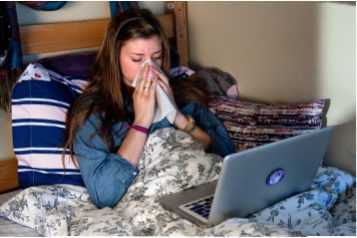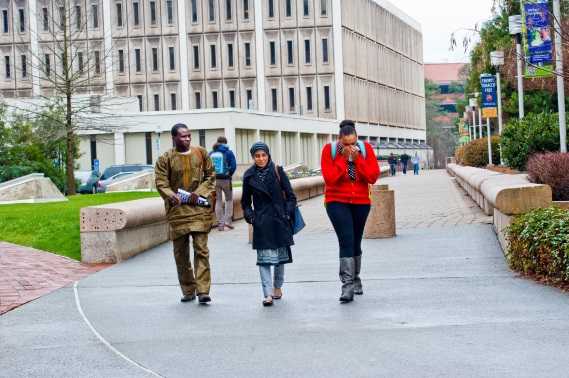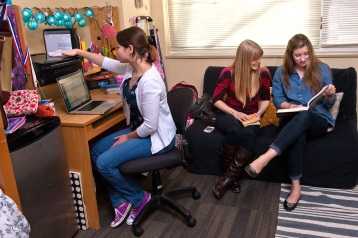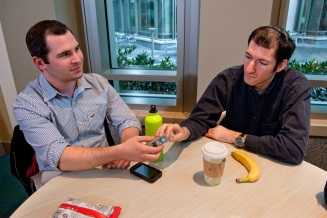Students at Institutions of Higher Education
Flu Prevention at Colleges and Universities
Campus life brings people together – in classrooms, dormitories, and at events and activities. Whether you are studying in the library, attending a sporting event, or hanging out with roommates in the dorm, you are surrounded by people. All this togetherness creates many opportunities for respiratory illnesses, such as flu, to spread.
Getting the flu vaccine every year is the best way to prevent seasonal flu. Nonpharmaceutical Interventions (NPIs) can also help you protect yourself and others from getting and spreading the flu. NPIs are actions that people and communities can take to slow the spread of flu. They include simple everyday preventive measures, such as staying away from other people when you are sick, covering your coughs and sneezes, and washing your hands often. Whenever you take any of these actions, you are practicing an NPI.
NPIs are especially important during outbreaks of pandemic flu. A pandemic flu outbreak occurs when a new strain of influenza virus appears among people. Because it is a new virus, people have little or no immunity to it. This allows the virus to spread quickly from person to person around the world. NPIs are especially important during a pandemic flu outbreak because it may take months before an effective vaccine is developed, manufactured, and delivered to the public.
Flu is nothing to sneeze at. Unlike many other viral respiratory illnesses, such as the common cold, the flu can cause severe illness and life-threatening complications in many people — even young healthy adults. Getting vaccinated against the flu every year is the best way to protect yourself from seasonal flu.
The actions you take and plans you make today make a difference. Here are some important steps for protecting yourself and others from getting and spreading the flu, both on and off campus:
1. Staying away from other people when you are sick.

- Stay out of class and away from others as much as possible until your fever is gone for 24 hours without the use of fever-reducing medicine.
- If your school has a “flu buddy” program, join up with a friend and help each other if one of you gets sick.
- If you have roommates, see if they can stay in another dorm or with friends until you get well.
- Keep in touch with student health services, your professors, and friends through email, text, or phone.
- Get plenty of rest.
- Drink clear fluids, such as water, sports drinks, or electrolyte beverages.
- Acetaminophen or ibuprofen may help reduce fever, headache and body aches.
- If you have a medical condition or are at high risk for flu complications, talk to your health care provider
2. Keeping your distance.

- People with flu can spread it to others at least 3 feet away.
- Flu is contagious. Stay away from sick people.
- People who are sick with flu may have no symptoms. They may pass the flu onto other people before they even know they are sick.
- Avoid sharing eating utensils and dishes with people who are sick.
* During a flu pandemic *
- Avoid places where large groups of people gather, such as classes, concerts, festivals, and sporting events, especially if you are at high risk for flu complications.
- Look for ways to participate in gatherings or classes virtually or via TV to avoid face-to-face contact with people who may be sick.
3. Stopping the spread of germs by covering coughs and sneezes.

- Cover your nose and mouth with a tissue when you cough or sneeze.
- Throw away the used tissue, and then wash your hands.
- Covering your coughs and sneezes with a tissue helps prevent the spread of the flu virus through the air and on your hands.
* During a flu pandemic *
You may choose to wear a facemask when you are sick to help lower the risk of spreading illness to others.
4. Washing your hands.

- Wash your hands thoroughly and often with soap and warm water.
- If soap and warm water are not available, use an alcohol-based hand sanitizer with at least 60% alcohol.
- Avoid touching your eyes, nose, or mouth.
Washing your hands lowers the amount of flu virus that can spread when you shake hands with other people or touch surfaces and objects, such as keyboards, TV remotes, desks, and doorknobs.
5. Cleaning frequently touched objects and surfaces.

- Keyboards, TV remotes, phones, desks, and doorknobs should be cleaned often and thoroughly.
- Studies have shown that human influenza viruses generally can survive on surfaces up to 48 hours. During that time, the virus may potentially infect other people.
- Soap and water are all you need to remove the flu virus.
- You can also use a bleach-and-water solution or disinfectant with a label that says “EPA approved” for killing viruses and bacteria. Always follow directions on product labels.
6. Being prepared and informed.

- Get the seasonal flu vaccine as soon as it becomes available.
- Be aware of flu outbreaks and their severity in your community and on campus.
- Pay attention to instructions from your school’s student health center and your local public health department.
* During a flu pandemic *
- Get the pandemic flu vaccine as soon as it becomes available in your area.
- Make plans for what to do in the event that your local public health department recommends closing campus or canceling events.
- Use nonpharmaceutical interventions (NPIs), such as staying away from other people when you are sick, covering your coughs and sneezes, and washing your hands often, to help slow the spread of pandemic flu.
- Page last reviewed: August 2, 2017
- Page last updated: August 2, 2017
- Content source:


 ShareCompartir
ShareCompartir